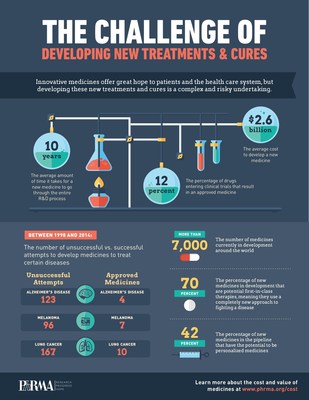Prescription medicines save lives and cut health care costs, but conjuring a drug to life is a challenging undertaking – and the science is only getting harder.
While it may sound counterintuitive, as our understanding of science grows, so does the complexity of developing new medicines -- particularly as treatments are increasingly tailored to the unique needs of individual patients. Failure is an inherent part of this complex process and the odds of success are low -just 12 percent of drugs entering clinical trials ever making it to patients. And thousands won't even make it past the early discovery and pre-clinical testing stages.
Through failure, comes success. For example in the past 16 years, there were more than 100 unsuccessful attempts to develop medicines to treat Alzheimer's disease, 96 for melanoma and 167 for lung cancer. During this same period, 3 medicines were approved to treat Alzheimer's, 7 for melanoma and 10 for lung cancer.
Biology isn't rocket science. It's harder than rocket science. Each living thing is an amazingly complex system and each interacts with other living things in complex ways. That is why discovering and developing new treatment and cures is such a complex and risky undertaking. On average, it takes more than 10 years for just one medicine to make its way through the entire R&D process. And the average cost to develop just one medicine has risen to $2.6 billion.
Despite these risks and challenges, America's biopharmaceutical companies are tireless in their pursuit of discovering new innovative medicines to improve the lives of patients. With more than 7,000 medicines in development around the world, PhRMA has never been more optimistic about the future and the potential to help patients live longer, healthier lives.



